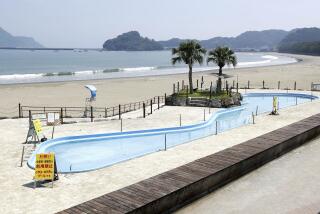Electricity-strapped Japan alters work hours, wardrobes
- Share via
Reporting from Tokyo — In a nation where workers are known to spend long hours at the office, many salarymen are facing a rare commodity this summer: free time.
These days, 7,400 Tokyo metropolitan government employees arrive at their desks — and go home — an hour earlier than usual.
It’s part of an ambitious plan by the government to cut energy consumption as Japan faces possible electrical shortages after the devastating earthquake and tsunami that knocked out a major nuclear power plant.
The earlier start time means fewer workers at the office during late afternoon, when energy usage peaks.
It also means that government employee Takeshi Katoya has been able to take a few evening jogs, a pleasure he could never fit into his schedule before.
“I finish work and it’s still bright outside,” said Katoya, 29, who now works 7:30 a.m. to 4:15 p.m. most days. “I thought this new schedule might be hard, but I like it.”
The drawback: Because he has to be up at 5:30 a.m. for his commute, his bedtime is earlier. “That’s the only thing, making sure I don’t burn the midnight oil,” he said.
The March 11 quake-triggered tsunami that hit Japan’s northeastern coast crippled the Fukushima Daiichi nuclear plant, denting the nation’s power production. With other plants closed for maintenance, officials worry the result will be rolling blackouts during the hot summer months.
To prevent that, officials are asking corporations and households around Tokyo and other areas affected by the quake to cut electricity usage by 15%. By way of example, the Tokyo government has pledged to shave 25% off its energy use by mothballing some elevators, reducing office lighting and setting government thermostats to a balmy 82 degrees.
The government’s message even extends to fashion: Dark suits and ties are decidedly out this summer. Instead, workers are being told, think like an Okinawan and go casual, with untucked tropical shirts, light cotton pants and even sneakers, if you dare.
The “Super Cool Biz” program aims to relax the dress code for business and political meetings, so the stuffed-shirt crowd can adopt the look favored on Okinawa island and crank down the air conditioning.
Corporate Japan has also pledged to do its part. Some firms are allowing employees to work from home. Manufacturers including Sony and Canon plan to introduce summer work hours similar to those of the Tokyo government.
Other companies are extending their seasonal shutdowns, and automakers such as Toyota, Nissan and Honda plan to switch to a Saturday-Wednesday workweek, to take advantage of lower energy draws on the weekend.
Service industries are changing to accommodate the new workday schedules. Some cafes are opening earlier, and fitness centers are allowing customers with restricted plans to come in on weekdays.
With thermostats set higher, some restaurants face a problem: How do you make diners feel cool even when the air conditioning isn’t running full-blast?
One chain is relying on what’s known here as “the green curtain” — a barrier of plants outside large windows to block the sun’s rays. Hideki Jinnouchi of the Skylark Group of family restaurants says the chain is hoping its still-growing plants will do the trick this summer.
Meanwhile, Tokyo’s famed neon lights and electronic billboards have been dimmed in many parts of the city. Public escalators stand frozen, and even the ubiquitous street vending machines have less lighting.
The government’s suggestions on business attire are a retooling of a program started in 2005 to fight global warming. Many people initially resisted the idea as undignified, but nowadays, officials say, polo shirts, jeans and the jacketless look are acceptable for business and, yes, even government meetings.
The Environment Ministry sponsored a recent fashion show of Kariyushi shirts, Okinawa’s version of the Hawaiian shirt, one of which was donned by President Clinton during a recent visit here.
Still, some office workers continue to disdain casual wear in the workplace, national emergency or not. Many are sticking with their old wardrobes, and bringing out the paper fans to beat the heat.
Nagano is a special correspondent.
More to Read
Sign up for The Wild
We’ll help you find the best places to hike, bike and run, as well as the perfect silent spots for meditation and yoga.
You may occasionally receive promotional content from the Los Angeles Times.











